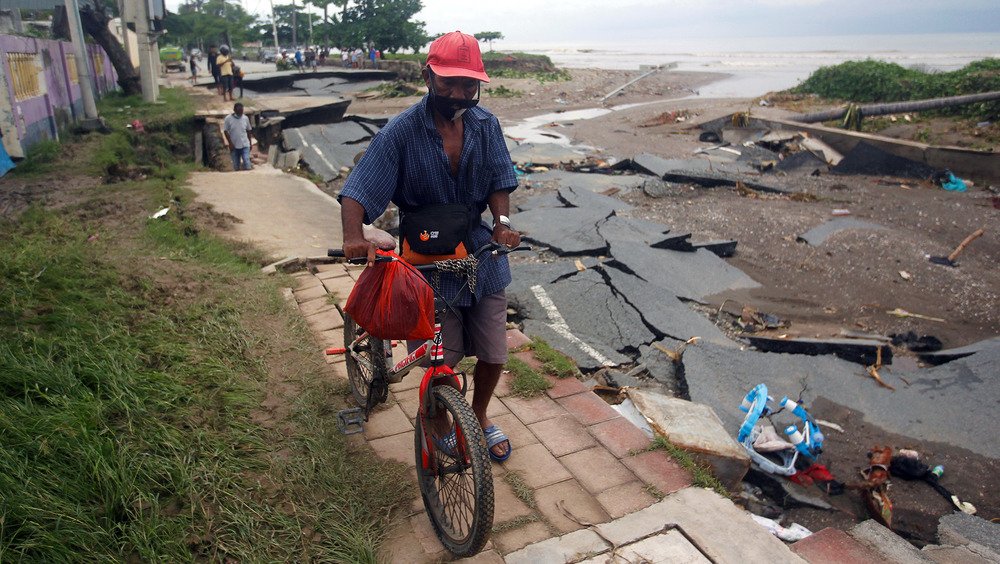
Malnutrition, COVID-19, and food affordability are emerging as growing worries as Timor-Leste digs out from its worst flooding in decades.
Days of heavy rain triggered severe floods and landslides that swept through parts of the Pacific nation in early April. As relief operations ramp up, aid agencies say cases of diarrhoea are appearing in evacuation centres.
“There is an immediate need to establish a referral system for severe [and] critical cases of malnutrition,” UN agencies said in a 16 April report.
It took nearly a week for significant donor funding to kick in after the country’s most severe floods in 40 years. Heavy rains, worsened by a tropical cyclone that also damaged parts of eastern Indonesia and Western Australia, caused a sudden deluge concentrated in the capital, Dili. At least 45 people died.
The government says some 25,000 households are affected, which would add up to about 10 percent of the country’s population. Some 8,800 people were still in evacuation centres as of 15 April.
“The people who are still staying at the IDP camps right now, they lost pretty much everything,” said Berta Antonieta Tilman Pereira, a community organiser who helped launch an early response to the floods. “They didn’t even have food to eat. They didn’t have clothes to wear.”
The disaster overlaps with a surge in coronavirus infections. The government relaxed COVID-19 restrictions after the floods; since the end of March, cases have doubled to more than 1,100.
Food prices are also rising, raising fears that a population already hit by widespread job losses and hunger during the pandemic will face more hardship in the coming months. The UN said the price of rice has jumped by 7 percent in the last two weeks after the floods damaged rice fields and maize crops, and by more than 20 percent in a year.
“It’s a concern about what happens next,” said Peter Goodfellow, country director for the NGO CARE International in Timor-Leste. “We are concerned about what happens if there were to be another even minor emergency, be it a cholera outbreak or dengue. The resilience isn’t there. It could quite quickly become a very significant problem.”
Local volunteer groups were the first to respond as thousands of people headed to evacuation sites in churches or public buildings.
Antonieta was part of a group that set up an online campaign that raised more than $50,000. The funds helped run community kitchens serving hot meals to evacuees. The volunteers also distributed kitchen and hygiene kits.
“We need to be organised,” Antonieta said. “The system that we’re actually supposed to trust and rely on in case of emergency is totally slow and not responding, so the community themselves needs to be organised.”
The government declared a state of calamity and asked for international help on 8 April – at least four days after the disaster escalated. It called its first coordination meeting with humanitarian groups on 9 April, according to UN situation reports.
International funding has also lagged. Australia’s 11 April aid pledge of about $5.4 million came a week after the disaster.
The government didn’t clarify what it needed early on, which meant donors “were not able to be clear about what their response was”, Goodfellow said, though he added that many government employees and facilities were also hit by the floods.
Donors have now promised about $7.5 million in humanitarian funding, according to the UN. “Given the scale of damage, it is feeling underfunded,” Goodfellow said.
Fundasaun Mahein, a Dili-based civil society group, said the “slow governmental response” is part of longer-term problems that have grown, especially through the pandemic: The disaster “exposes further the state’s lack of capacity to respond to emergencies and meet our people’s basic needs”, the group said.
Analysts also say poor urban planning in Dili exacerbated the floods’ impacts. Timor-Leste sees frequent drought and floods, including a disaster that washed away some 200 homes last year. But this month’s floods have been particularly severe.
Timor-Leste’s government has budgeted about $1.4 million over three months to respond.
“People are suffering, families are suffering; they are homeless, without water, without electricity, and everything is flooded with mud,” said the country’s prime minister, José Maria de Vasconcelos, who is also known as Taur Matan Ruak.
As relief operations continue, aid groups warn that Timor-Leste needs to better prepare for weather extremes amid a global climate emergency.
“Climate change is clearly exacerbating the intensity and impact of these disasters,” the NGO Oxfam said in a statement.
“I wish they were more prepared,” Antonieta said. “The decision-makers, the government, need to be prepared for any crisis that’s coming.”